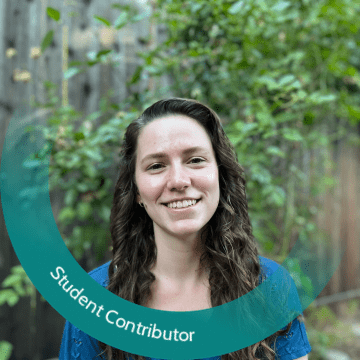Don’t Put Your Life on Hold: How I Learned to Balance School, Work, and Fun
As I prepared for my first quarter of college, my friends and family had plenty of advice to impart. Everything from tips on how to make a class schedule to recommending carrying snacks for boring lectures. (That one’s a lifesaver — just don’t bring anything crunchy.)
One thing I heard repeated over and over: “You need to focus on school first — the fun can come after.”
As it turns out, I needed to hear the exact opposite.
I had a hunch I wanted to be a veterinarian before I turned 10 and was dead-set on it by 16. Most undergrads on the pre-veterinary track hear again and again about how difficult it is to get into veterinary school. We’re told a lot of us won’t make it and will have to change career paths.
Rather than being deterred by this, though, many pre-vets respond to this pressure by becoming intensely driven and often competitive. Vet school is just one graduate program that’s becoming increasingly difficult to get into.
The summer before my third year of undergrad, I landed my dream job as a veterinary technician in the emergency room of one of my top vet schools. I was ecstatic. I’d worked in vet clinics for several years and felt so gratified to see my work paying off. Not only would I get to continue doing the job I loved, but I also couldn’t deny that having worked for a renowned school would likely increase my odds of getting accepted into vet school when the time came to apply.
“One thing I heard repeated over and over: ‘You need to focus on school first — the fun can come after.’ As it turns out, I needed to hear the exact opposite.”
On the morning of my first ER shift, I was determined to prove I was professional and capable. I set one foot through the door and walked smack into the middle of the first CPR I’d ever seen.
People were buzzing around the room, calling out medications, switching compressions, reading monitors, and trying to place IV catheters. I took one look and flattened myself to the wall. As I kept myself out of the way and waited to introduce myself, the one thought running through my head was: If I can make it through this first week, I can make it through anything.
That turned out to be true. Shifting from a small family practice to an enormous teaching hospital with many departments and hundreds of co-workers felt strange, but I finished my first week. Then my second.
Day by day and hurdle by hurdle, I adjusted to my new role. Within weeks, I’d fallen in love with it. Though I’d enjoyed my previous position, I found I preferred the fast-paced and unpredictable nature of emergency work. I looked forward to every shift.
Classes began during this time, and balancing work and school became a daily task. I could take my morning classes, study in the afternoons, work nights, and sleep in the next morning.
For a time, this worked well. I felt such a sense of accomplishment. I was working in the field I loved and doing well in my classes. I’d moved into a great house with one of my best friends. I was getting to live a future I’d never imagined possible. If at 17 I’d been asked what my ideal life would look like in three years, this was it.
And yet I felt empty.
“For a time, this worked well. I felt such a sense of accomplishment. … If at 17 I’d been asked what my ideal life would look like in three years, this was it. And yet I felt empty.”
My problem was that, while at work or in class, I could engage with my colleagues and classmates — but outside these spaces, I’d lost touch with friends and fallen out of my hobbies as a result of devoting myself entirely to work and school.
I would often pass up opportunities to go out, convincing myself I had too much homework or that I needed a good night’s sleep before an exam. This cycle was self-perpetuating: As long as I was at work or in class, I felt happy and complete. So I threw myself even more into these commitments.
I still loved working and learning, but when I inevitably had time off, I felt adrift. I’d lost touch with who I was outside of “pre-vet” and watched my identity beyond my career rapidly slip away. The realization that I was uncontrollably losing my sense of self is what finally woke me up.
I’ve watched similar versions of this cycle play out with friends. The looming knowledge that your goals are becoming ever more challenging to achieve in the face of increasing competition for limited graduate programs and even more limited scholarships ratchets up anxiety. The common response to this fear is the determination to work harder, devote yourself more thoroughly to your goal, and outcompete your classmates.
My thoughts from my first hour in the ER sum it up: If I can get through this, I’ll be better in the future. If I can make it through the hectic, frightening years of undergrad and get accepted into vet school, then I’ll be happy.
I found myself dreaming about a new perfect future life, thinking about all the things I wanted to do once I got into vet school. The glaring hole in this logic is that there will always be another task to face — there will always be another exam, another degree to earn, another interview to ace. If you plan to live your life between big events, you end up procrastinating it indefinitely.
I saw how quickly I was heading toward a life of solely working up to the next big thing, and how easily my 20s and 30s could pass me by. I realized I would look back at my life at 40 or 50 and see how all I’d done was work since turning 16. That I would never have lived the life I dreamed of because I’d be too busy chasing the next goal to appreciate it.
“I realized I would look back at my life at 40 or 50 and see how all I’d done was work since turning 16. That I would never have lived the life I dreamed of because I’d be too busy chasing the next goal to appreciate it.”
What rescued me from this cycle was taking the space to put my identity back together. I started setting aside periods of time each week to do activities I used to enjoy. I began horseback riding again, spending more time with friends, and planning weekend trips I’d dreamed about.
While I worried taking more personal time could negatively impact my academic performance, that wasn’t the case. In fact, by giving myself more time to relax and enjoy life outside my professional and academic obligations, I felt more engaged when I did study. I no longer felt the weight of trudging toward a point in life when it would be OK to take time for myself.

The biggest change was that I was truly happy again, and that happiness wasn’t based on my perceived successes. If your life revolves around completing tasks well in school or work, even when you like these tasks, your happiness and self-worth will quickly become tied to your performance.
Making space for myself outside my career path enabled me to appreciate who I was and enjoy where I was in life, regardless of my abilities.
The piece of advice I wish I’d taken to heart before starting college is that no matter how difficult your next few years may be, don’t put your life on hold to pursue your future. Even if you relish what you’re learning — and no matter how accomplished you become — your 9-to-5 life won’t fulfill you without an outside community to balance it.
The life you want and the person you want to become aren’t handed to you with a diploma or a job offer. Your life is happening every single day, whether you celebrate it or wait for the “right time” to live it the way you want. There is no right time, so the sooner you start living the life you want, the longer you can enjoy it.
Meet the Author

Sophia Buckley is a fourth-year student studying biological sciences and anthropology at the University of California, Davis. She works as a veterinary technician in the Small Animal Emergency and Critical Care service at the university’s Veterinary Teaching Hospital.


